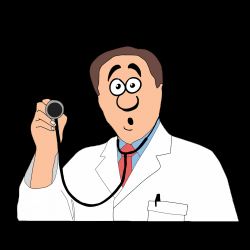The latest in a sadly recurrent theme of people posing as doctors when they have no such background or training is that of a Florida man who donned a white coat in advertisements that proclaimed he could cure diseases. He declared he could “treat hernias, diabetes, Parkinson's disease, cancer, multiple sclerosis, arthrosis, renal failure, vision problems, and a host of other health issues.” After the reality was uncovered by investigators that he never held a medical license in the state and he was subsequently arrested, he maintained “he did not believe he needed a license to practice medicine. He said he was a lab technician in Cuba and got his certificate for Iridology, herbology, and nutrition when he moved to Florida.”
One common aspect of such imposters is that they know just enough information to be dangerous. Mix in a confident demeanor or wanton disregard with some medical terminology or jargon and the threshold needed to dupe others is lowered. Iridology is an alternative practice where those who believe in it insist segments of the colored portion of your eye correspond to different body parts. For these practitioners, looking at the iris can be a key to diagnosing systemic disease. Herbology is the study and use of botany or plants for medical treatment or to impact overall well-being - it is not rooted in Western medicine. Nutrition is self-explanatory.
The slippery slope created by possessing nuggets of valuable information is what is often cultivated by charlatans to exploit the most vulnerable. They start from a truthful place. For instance, the eye, in general, is one component part to diagnosing disease. Properly examining it in its entirety with special equipment as well as an initial primary survey can yield great dividends like uncovering liver disease or warning signs for high blood pressure, diabetes and even brain tumors. But, applying this data in the context of the entire person through a thorough, comprehensive assessment by a trained physician is required for the safety and meaningful, positive outcome of the patient.
In this particular scenario, the accused did the following:
“arranged to meet a patient at a home...and, when the patient arrived, he was asked to fill out papers and pay $160...then checked the patient's blood pressure and then put a band around his head and asked him to hold a metal rod connected to a machine on a table that began making beeping noises once it was turned on. Deputies say he told the patient he was testing his heart, brain, intestinal system, bones, nerves, and "everything else." After the "test" was complete... told the patient he had diabetes, osteoporosis, and that he was not getting enough oxygen to his brain, among other ailments. He said that for only $2,000, he could cure the patient's diabetes by using a treatment that would include injecting the patient with "his own blood.”...told them [deputies] he draws the patient's blood, then injects the same blood he just withdrew because he says it "combats" the blood cells and boosts the immune system...Deputies say he also told the patient he cured the homeowner of his diabetes and called him on the phone to get his testimony.”
How do you separate fact from fiction?
This is increasingly problematic today. Home care services are exploding by legitimate health systems and physicians to start-up app companies. So, it is not completely out of the realm of possibility for a medical professional to provide care in this manner. Well-regarded visiting nurse services do this routinely, for example. The difference is it would be more typical to take place in the patient’s home, not a random house - and these services can be verified a number of ways (e.g. your insurance provider, the hospital that discharged you). The word “doctor” has gotten diluted with all sorts of degrees and certifications popping up that have nowhere near the academic or clinical rigor requisite to confer a traditional medical degree (aka M.D. or D.O.). See this piece to learn more: The Word ‘Doctor’ May Not Mean What You Think It Means.
That said, there are easy steps a patient can take to verify the credentials of a physician. First, ask to see identification documents. By law, they should be readily displayed in a doctor’s office. But, badges should also be unobstructed and easily viewed by patients - it is a patient’s right to know who is treating them, what his or her qualifications are to do so and whether or not they opt to consent. Also, each state has a medical licensing board. Go to your state’s website to find the specific caregiver’s listing or call the licensing body directly - if you have an issue finding it, then start with your area’s department of health. For instance, New York has the online physician profile where you can type in a name and validate a doctor’s status and history. Another avenue is to contact their specialty board, for gynecologists that would be The American College of Obstetricians and Gynecologists (ACOG) and for brain surgeons that would be The American Board of Neurological Surgery (ABNS) etc.
To learn more about how to be your own or a loved one’s advocate in healthcare, review my guide here. To appreciate the fallacy of getting “tested for everything” in medicine, read this piece.

